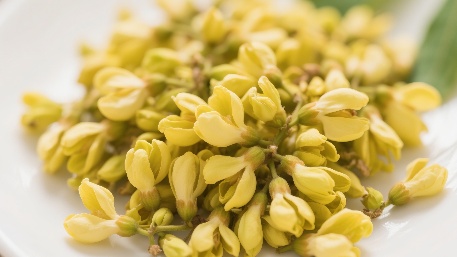When early summer comes, the delicate aroma of locust blossoms fills the air. But this humble flower is more than just a seasonal delight—it’s a time-honored herb used in both cuisine and traditional Chinese medicine. Let’s uncover its hidden potential.

Table of Contents
- Types and Botanical Origin
- Nature, Taste & Meridians
- Main Benefits & TCM Applications
- Culinary Uses & Health Benefits
- Cautions and Contraindications
1. Types and Botanical Origin
The term “locust flower” refers to the blossoms or buds of the Sophora tree, a member of the legume family.
🌳 Three main types:
- Sophora japonica (Huai tree): Yellowish flowers, low aroma, commonly used in TCM
- Black locust (Robinia pseudoacacia): White, fragrant blossoms often eaten
- Purple/pink locust (decorative only): Ornamental, not edible
🏡 In Chinese culture, the locust tree is known as the “protector tree,” symbolizing strength and longevity.
2. Nature, Taste & Meridians
📌 Taste: Bitter
📌 Nature: Slightly cold
📌 Meridians: Liver, Large Intestine
It is known to cool the blood and stop bleeding, while also clearing heat from the liver and intestines. Best for individuals prone to bleeding due to heat or liver fire.
📖 Essentials of Medical Forest states:
“Drains lung and heart fire, calms the liver, strengthens the kidneys.”
3. Main Benefits & TCM Applications
✅ Cools blood and stops bleeding: For hemorrhoidal bleeding, bloody stool, heavy menstruation
✅ Clears liver fire: Helpful in eye redness, headache, and dizziness
✅ Protects cardiovascular health: Rich in rutin, supports vessel integrity and reduces blood pressure
📖 Often called the “heart-guarding flower,” modern studies show:
- Enhances capillary resilience
- Reduces cholesterol
- Increases coronary blood flow
4. Culinary Uses & Health Benefits
🌸 Black locust blossoms are edible and fragrant.
🍴 Popular preparations:
- Stir-fried with eggs
- Steamed cakes or pancakes
- Mixed in porridge or tofu dishes
💪 Nutritional perks: Contains rutin, flavonoids, and vitamin P, beneficial for vascular protection, inflammation reduction, and antioxidant effects.
5. Cautions and Contraindications
⚠️ Despite its benefits, not suitable for everyone:
🚫 Avoid if you have cold constitution or weak digestion
🚫 Not recommended for those with yin deficiency and false heat
🚫 Do not overconsume—it’s slightly cold and may damage yang energy if taken in excess
✅ Conclusion
Fragrant and graceful, the locust flower is a potent herb in disguise. From soothing internal heat to strengthening vessels, it truly earns the title of “heart guardian.” But remember, use with balance and care—and let its quiet strength gently protect your well-being.